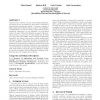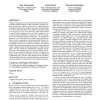ATAL
2009
Springer
14 years 6 months ago
2009
Springer
There is currently an ongoing demand for richer Intelligent Virtual Environments (IVEs) populated with social intelligent agents. As a result, many agent architectures are taking ...
ATAL
2009
Springer
14 years 6 months ago
2009
Springer
Distributed Constraint Optimization (DCOP) is useful for solving agent-coordination problems. Any-space DCOP search algorithms require only a small amount of memory but can be spe...
ATAL
2009
Springer
14 years 6 months ago
2009
Springer
Game-theoretic solution concepts, such as Nash equilibrium, are playing an ever increasing role in the study of systems of autonomous computational agents. A common criticism of N...
ATAL
2009
Springer
14 years 6 months ago
2009
Springer
A combinatorial auction mechanism consists of an allocation rule that defines the allocation of goods for each agent, and a payment rule that defines the payment of each winner....
ATAL
2009
Springer
14 years 6 months ago
2009
Springer
A system built in terms of autonomous agents may require even greater correctness assurance than one which is merely reacting to the immediate control of its users. Agents make su...
ATAL
2009
Springer
14 years 6 months ago
2009
Springer
Certain observable features (tags), shared by a group of similar agents, can be used to signal intentions and can be effectively used to infer unobservable properties. Such infere...
ATAL
2009
Springer
14 years 6 months ago
2009
Springer
Weighted voting games are a natural and practically important class of simple coalitional games, in which each agent is assigned a numeric weight, and a coalition is deemed to be ...
ATAL
2009
Springer
14 years 6 months ago
2009
Springer
Alternating-time temporal logic (atl) is one of the most influential logics for reasoning about agents’ abilities. Constructive Strategic Logic (csl) is a variant of atl for im...
ATAL
2009
Springer
14 years 6 months ago
2009
Springer
As agents begin to perform complex tasks alongside humans as collaborative teammates, it becomes crucial that the resulting humanmultiagent teams adapt to time-critical domains. I...
ATAL
2009
Springer
14 years 6 months ago
2009
Springer
In hedonic games, players have the opportunity to form coalitions, and have preferences over the coalitions they might join. Such games can be used to model a variety of settings ...


